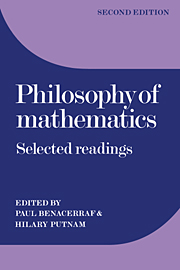Book contents
- Frontmatter
- Contents
- Preface to the second edition
- Introduction
- Part I The foundations of mathematics
- Symposium on the foundations of mathematics
- Disputation
- Intuitionism and formalism
- Consciousness, philosophy, and mathematics
- The philosophical basis of intuitionistic logic
- The concept of number
- Selections from Introduction to Mathematical Philosophy
- On the infinite
- Remarks on the definition and nature of mathematics
- Hilbert's programme
- Part II The existence of mathematical objects
- Part III Mathematical truth
- Part IV The concept of set
- Bibliography
Disputation
Published online by Cambridge University Press: 05 June 2012
- Frontmatter
- Contents
- Preface to the second edition
- Introduction
- Part I The foundations of mathematics
- Symposium on the foundations of mathematics
- Disputation
- Intuitionism and formalism
- Consciousness, philosophy, and mathematics
- The philosophical basis of intuitionistic logic
- The concept of number
- Selections from Introduction to Mathematical Philosophy
- On the infinite
- Remarks on the definition and nature of mathematics
- Hilbert's programme
- Part II The existence of mathematical objects
- Part III Mathematical truth
- Part IV The concept of set
- Bibliography
Summary
Persons of the dialogue: Class, Form, Int, Letter, Prag, Sign
Class: How do you do, Mr. Int? Did you not flee the town on this fine summer day?
Int: I had some ideas and worked them out at the library.
Class: Industrious bee! How are you getting along?
Int: Quite well. Shall we have a drink?
Class: Thank you. I bet you worked on that hobby of yours, rejection of the excluded middle, and the rest. I never understood why logic should be reliable everywhere else, but not in mathematics.
Int: We have spoken about that subject before. The idea that for the description of some kinds of objects another logic may be more adequate than the customary one has sometimes been discussed. But it was Brouwer who first discovered an object which actually requires a different form of logic, namely the mental mathematical construction [L. E. J. Brouwer 1908]. The reason is that in mathematics from the very beginning we deal with the infinite, whereas ordinary logic is made for reasoning about finite collections.
Class: I know, but in my eyes logic is universal and applies to the infinite as well as to the finite.
Int: You ought to consider what Brouwer's program was [L. E. J. Brouwer 1907]. It consisted in the investigation of mental mathematical construction as such, without reference to questions regarding the nature of the constructed objects, such as whether these objects exist independently of our knowledge of them.
- Type
- Chapter
- Information
- Philosophy of MathematicsSelected Readings, pp. 66 - 76Publisher: Cambridge University PressPrint publication year: 1984
- 1
- Cited by



